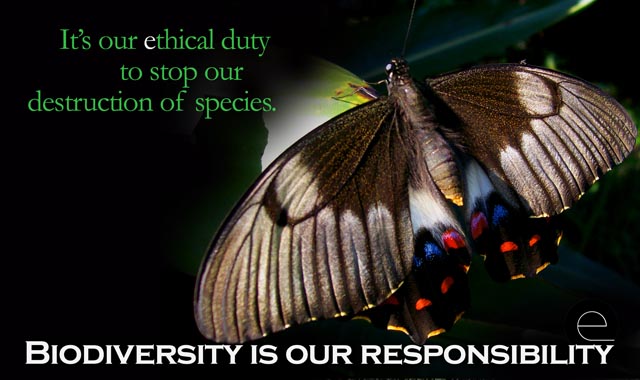Search
Recent comments
- Noam's....
10 min 16 sec ago - US pirates....
15 min 8 sec ago - defence?....
22 min 53 sec ago - fascista....
3 hours 28 min ago - cooperation...
6 hours 44 min ago - AI at WSWS....
6 hours 57 min ago - palestine....
7 hours 6 min ago - dropped charges....
7 hours 21 min ago - "hope"....
8 hours 9 min ago - respect....
9 hours 11 min ago
Democracy Links
Member's Off-site Blogs
the fragility of species...

- By Gus Leonisky at 19 Oct 2010 - 11:01am
- Gus Leonisky's blog
- Login or register to post comments
the beauty and the beast...
We often swoon about butterflies... In fact many butterflies do more damage to our plants that other insects we kill. The larval stage of these creatures is hungry for plant material while the adult stage participate in the pollination of plants, like bees. Other insects like locusts will destroy crops at a rate of knots. So we use insecticides. These of course affect the entire food chain, leading to the reduction and extinction of birds that feed on insects. Unfortunately these poisons need to be more and more potent as some individuals of an insect species develop resistance to the deadly poisons and pass on the resistant gene to future generations. Thus we increase the potency and quantity of poison, till we find it affects our own lives such as DDT did and does..
The symbol e is that which I have created to represent Organica Spiritualia. This is to relate our "spiritual being" to nature. In fact it is our human intelligence (reactive animalistic processing of environmental factors for survival into stylistical actions) that creates our "spirtual being". Our consciousness is organic, based on our memory. Most animals that have a central memorising system of environmental factors can have a consciousness of space and position.
Our individual memory is greater than that of individuals in others species and gives us the ability to invent a lot of solutions, including fake solutions that solve "problems" nonetheless... But beyond these fake solutions, including ethical solutions, there are relationship between our generosity and species that do not really matter to our survival.
Organica spiritualia gives us the power to be generous to nature beyond our needs. But our needs are bathed more and more in greed, another Organica Spiritualia activity with less ethical understanding of where we are at at this point in time — an evolved being from a soup of life on a planet to which we could decide we owe nothing to.
The relationships between human survival and that of other species is often not as important as we could think... But this relationship is more important than our needs, because at this point in time we have evolved to be where we are — together on the planet. It's an ethical choice in which our judgement (or carelessness) of life or death over other species may alter the course of our future history or not... It is a stylistic choice. Extinction of species resulting from our activities is our stylist choice. We can and should choose different and care better.
extinction of species is forever.
metamorph...
The life cycle of an insect begins with an egg, which then hatches into a larva. For the juvenile insect, life is taken up with eating, growing, moulting, and growing bigger until it is ready to become an adult.
http://museumvictoria.com.au/bugs/life/cycles.aspx
300 million years...
Gus: some species have endured "beyond time".
Stromatolites first recognised in the geological record from about 3.5 billion years ago still exist today in specific but fragile environments.
Cycads species such as the one above have not changed much in 300 million years.
Terrestrial life is actually quite recent in comparison with the soup of life that started more than 3.6 billion years ago.
The first terrestrial life appeared about 470 million years ago, as an adaptation of life from the sea.
The present rate of extinction of species is "unaturally" super fast. Human decimation of natural habitats, human use of poisons, human killings of individuals of species beyond sustainable levels and human extraction of long buried carbon sinks change the dynamic of life on earth faster than we, humans, realise.
trampling the flowerbeds in eden...
Talks have run through the night at the UN Convention on Biological Diversity meeting as delegates tried to salvage talks on protecting nature.
Major differences remained on targets for protected areas, equitable access to genetic resources, and funding.
France followed Japan in pledging funds for conservation; but the sums were well short of what poorer nations want.
Brazil is arguing that by 2020, $200bn per year should be made available for biodiversity conservation.
By comparison, the new pledge by French Ecology Minister Chantal Joannou amounted to $4bn over a decade.
http://www.bbc.co.uk/news/science-environment-11642538
http://www.bbc.co.uk/news/science-environment-11649278
-----------------------
Gus: we spend a million times more on ways to destroy the planet than to protect it from ourselves...
We're not going to save it, are we?... We still don't have the picture, have we?...